This program was adopted as part of the Program for Promoting High-Quality College Education in the fiscal year 2008. It was recognized as initiative which focuses on a device and improvement of educational methods. Our program name is “Nursing Education in a Unique Island Environment: A Systematic Practicum Enhancing Community Perspective and Collaboration.” The term of the project is 3 years between the fiscal year 2008 and 2010.
1. Introduction
The project aims to leverage a unique island environment to learning advantage for educational practice of health nursing and develop a systematic on-island practicum that equips students with community perspective and collaboration ability. In concrete terms, it establishes a training system and on-site training environment on islands. For the establishment of training system in islands, college instructors, island nurses and residents collaboratively participate in “development of the on-island practicum model” with a device and improvement of educational methods. The arrangement of on-site training environment includes construction of ICT environment which results in improvement of access between the college and islands as well as mobilization of “learning in islands” for students.
Through education for students – by collaborative efforts among college instructors, island nurses and residents – the project not only enhances students’ development, but also improves educational ability of college instructors, practice skills of nurses and awareness of island residents about their expected roles.
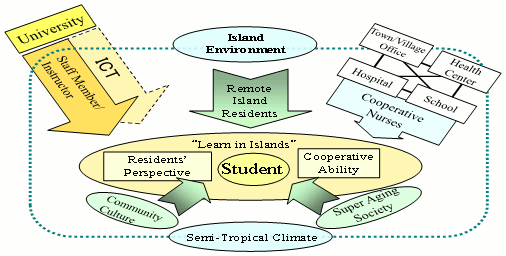
Chart 1: Educational Practice of Health Nursing That Leverages Island Environment to Learning
2. Program Objective
This project aims to strengthen mechanisms of human resource development; the aim is stated in the educational philosophy and objective of the Okinawa Prefectural College of Nursing: “share the concept of health nursing, medical care and welfare, and then develop the skill and ability that enable to play professional nursing roles by cooperation with other related professionals” and “understand geographical and cultural characteristics wherein people reside, and then develop the skill and ability that enable health nursing practices embedded in communities.”
The objectives of education for students are to equip them with “community perspective” by having them experience community culture that remains in island life of super aging society and to develop “collaborative ability” through practices with cooperative nurses. Moreover, it aims to develop ability to utilize ICT that is vital to overcome remote disadvantages such as lack of resources in health nursing, medical care, welfare and education.
Through this project, it is expected that students are able to understand geographical and cultural characteristics of a community; to regard objects of nursing in terms of totality, locality, individuality and continuity of island life; and to develop ability of problem solving and practical nursing through autonomous learning.
5 concrete objectives for students are as follows.
嘆 |
To be able to practice nursing activities that grasp the existence form of community members with regard to geographical and cultural characteristics and holistically grasp the objects |
嘇 |
To learn how to work together with various professionals and residents by participatory learning of problem solving process for health related problems |
嘊 |
To experience strength of geographical and cultural characteristics on islands, and then to recognize interest and potential of health nursing |
嘋 |
To enhance will to learn autonomously |
嘍 |
To enhance interest in island regions |
3. Education Method
The educational method is to work collaboratively among island residents, health nurses and college instructors. The island residents participate in education as lecturers, host families and conveyance volunteers; it enhances students’ learning of community perspective. The island nurses work with local professionals and provide students with nursing training and guidance. The college instructors provide on-site guidance as well as training through use of ICT.
4. Implementation Framework and Plan
1) Implementation Framework
In the college, we establish the “GP Promotion Committee” as well as 2 supporting organizations: the “Administrative Office GP Team” and the “GP Instructors Team.”
In the island, we establish the “Committee for the Promotion of Island Training” and pursue the education objectives with support of the “Coordinating Council for the Guidance of Island Training” and cooperation with the GP Instructors Team. Furthermore, we arrange an “On-Island Practicum Coordinator” as well as a “Volunteer Coordinator” which enhance implementation of the project.
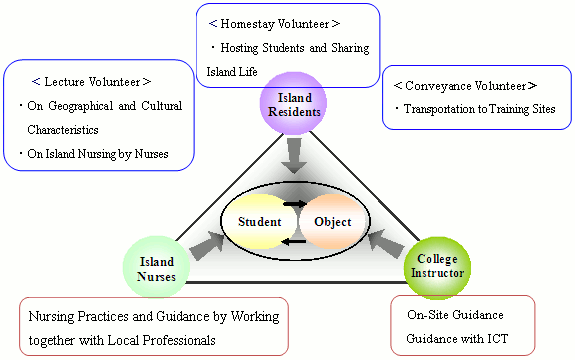
Chart 2: Education Method
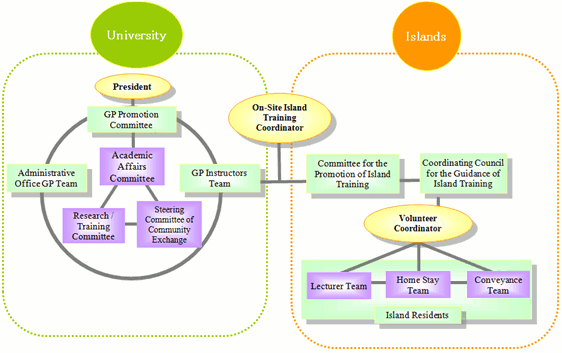
Chart 3: Implementation Framework
2) Implementation Plan
In the first year, referring to the Miyako Island as a model island, the on-island practicum and seminar program is developed. In the second year, with educational support of college instructors who are training instructors as well as of island residents and nurses, actual development of the program takes place. I the third year, while the program is developing, the overall evaluation of the program is conducted; and then the course of action after the program completion is proposed.
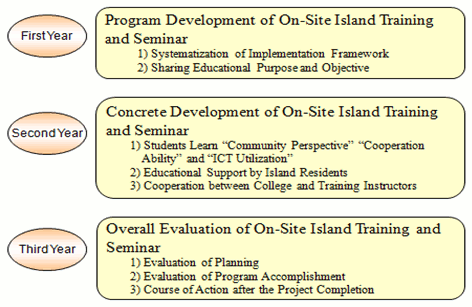
Chart 4 Implementation Framework
5. Evaluation System
The evaluation is conducted by the GP Promotion Committee which includes external examiners. The evaluation method is to implement the focus group interviews with training participants. Moreover, the students, college instructors and nurses are evaluated by making reference to the accomplishment index.
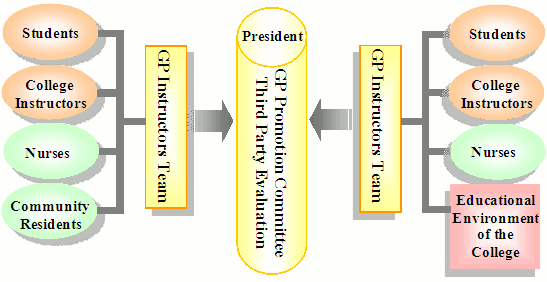
Chart 5: Evaluation System
6. Expected Outcome
The students are expected to learn “community perspective” “collaborative ability” and “ICT Utilization.” The college instructors are able to improve teaching skills and to share concrete educational objectives. By giving guidance to the students, the island nurses are provided with an opportunity for review of own nursing practices and for continuing education. The island residences who participate in the teaching process are able to recognize the island strength. The residents are provided with a new role that is to participate in guidance for the students.
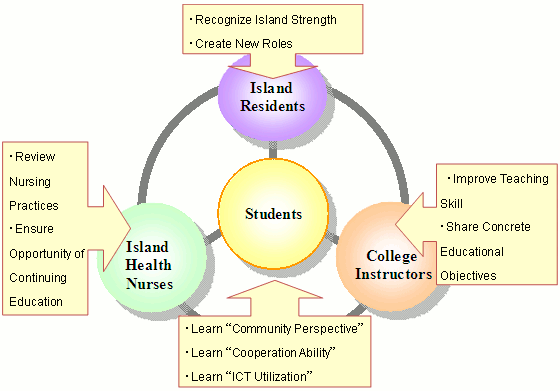
Chart 6: Expected Outcome
|








